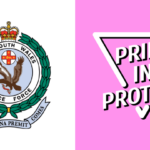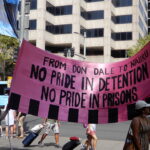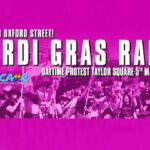Mardi Gras Police Accords Voted Down: Pride in Protest’s Luc Velez on the Progressive Shift
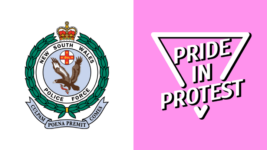
Pride in Protest’s Luc Velez picked up the second highest primary vote at this year’s Sydney Gay and Lesbian Mardi Gras board election, which showed a marked shift in the political leanings of those attending the annual general meeting that was further evidenced in terms of motions being passed.
Established in 2018, Pride in Protest has consistently been calling for entities like the NSW Police Force and the Liberals to be barred from an event that, at its inception, was about upholding the basic rights of LGBTIQA+ people, who’d long been subjected to violence and discrimination born of ignorance.
Needless to say, an event that PiP had deemed overly corporatised wasn’t too keen when the social justice motions started appearing on the AGM agenda, which involved calling for bans on police, ending corporate sponsorship and preventing the pinkwashing of conservative parliamentarians.
However, this year, all that changed, as not only did Velez pick up a significant swag of the votes, but the meeting voted to end the police accord, an agreement on how the event was being patrolled, which was a motion PiP put that had been voted down at an earlier annual meeting.
The thin blue line
The 2014 Mardi Gras Police Accord was established following the blanket law enforcement approach taken by NSW police during the 2013 Mardi Gras parade, which saw a number of incidents of excessive force by police officers, including the assault on then 18-year-old Jamie Reed.
Pride in Protest brought the issue of the police accord to the fore at last year’s AGM, especially due to a provision that has allowed officers to surveil the parade prior to commencement in order to conduct “decency checks”, which see officers assess whether participants are dressed appropriately.
A key issue with the accord, especially this power that provides that officers are the final arbiters of taste at an LGBTIQA+ event, is that the NSW Police Force has traditionally been an institution fraught with homophobic and transphobic tendencies.
Indeed, the hostile nature police have historically harboured towards queer communities was on full display during the initial 1978 Mardi Gras event, which was a protest march calling for equal rights that was subsequently surrounded by police officers and then attacked.
Silenced by the establishment
Pride in Protest also raised a motion calling for justice on Palestine in the face of the prolonged genocidal military operation in Gaza, in terms of participating in the broader Boycott, Divestment and Sanctions (BDS) movement, which was a motion that was prevented from being put to the vote.
“The motion was voted down with no justification – leaving our community unsure why Mardi Gras has refused to speak out about an ongoing genocide of Palestinian people,” said Velez, now a Mardi Gras board member, in a 13 December statement.
Sydney Criminal Lawyers spoke to Pride in Protest’s Luc Velez about the AGM voting down the accord with NSW police, the shift this marks in terms of what grassroots Mardi Gras participants expect, and what the socially justice-minded group will be focused on moving into the new year.
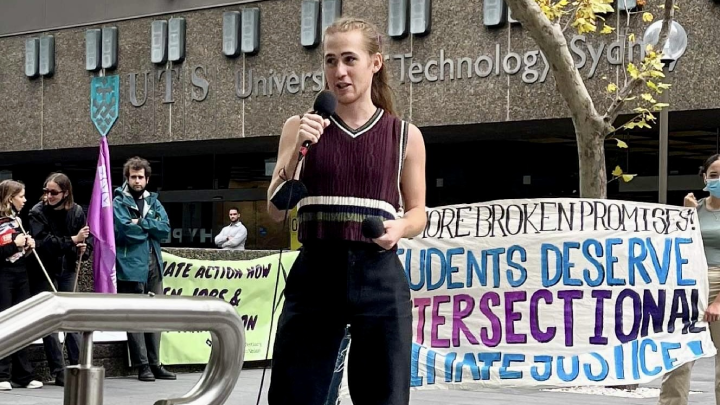
Pride in Protest ran four candidates in this year’s election for the Sydney Gay and Lesbian Mardi Gras board at the 9 December annual general meeting.
Luc, you were elected on to the board, and as usual, PiP put some controversial motions to the meeting.
However, this year, the AGM voted in favour of the PiP motion calling for an end to the police accord, which was an agreement made between NSW police and the Mardi Gras in terms of the law enforcement approach taken to the event.
PiP has been calling out NSW Police Force participation in the annual event since it began. What is the police accord? And what does the success of the motion mean?
The police accord was an agreement between the police and Mardi Gras following quite a brutal attack on an attendee.
The first issue with the accord was that it wasn’t made public. So, for quite some time we didn’t know what was in it, and we didn’t know how far Mardi Gras was facilitating these police operations.
It’s subsequently been released. But as to its operation, at the AGM and just after it, there has been a lot of debate about what the accord did.
The question was did it give the police the powers to do certain checks, or did the police always have those powers and Mardi Gras had been facilitating the use of the powers they already had?
For me, the bigger picture is that it doesn’t really matter either way, because, in many respects, Mardi Gras shouldn’t be working with the police. We certainly shouldn’t be making their jobs easier.
This is the organisation that, during the first Mardi Gras of 1978, was extremely violent to the protesters.
Officers beat up people and then leaked participant names to the Sydney Morning Herald to see them discriminated against and humiliated before their landlords, bosses and families.
It shouldn’t be our job, as Mardi Gras, to help the police do their thing, understanding that this entails the outrageous overpolicing of First Nations communities, often ending in fatalities, enforcing drug laws with sniffer dogs, which make our communities much more unsafe, and it also deliberately undermines harm minimisation approaches.
Our relationship with the police shouldn’t be collaborative.
The motion passed at the AGM. But we ended up splitting it into two, as the original motion had a separate section calling for police abolition. And I’m not surprised we had to do that, as I don’t think that was going to come to consensus in that room.
We moved those four words out of the motion and put it into a separate motion. But the motion still didn’t just talk about decency checks at Mardi Gras, it also condemned the use of drug dogs and heavy policing.
It also reaffirmed that we still stand in solidarity with Black Lives Matter and to end deaths in custody, and we supported the right to protest and the lifting of the antiprotest laws, which had been particularly on our minds, following the brutal police repression at the Palestine rally around Zim shipping, which saw a few queer activists arrested.
That motion had been put up unsuccessfully in the past. So, would you say there has been a change in opinion?
Totally. The long campaigning from Pride in Protest and other progressive campaigners has been working.
It is a win. But because of how corporations act and work, this doesn’t necessarily mean our work is done and the accord is being torn apart.
The next step is making sure that Mardi Gras goes through with this, as they aren’t legally obligated to follow what the AGM has decided.
I and other members will be pushing to see this through, so this commitment is respected.
PiP put a Free Palestine motion on the AGM agenda this year, due to the ongoing genocide taking place in Gaza. Your motion called for boycott and divestment from Israeli entities. However, debate on these points was prevented.
What did the motion advance? And what happened to prevent debate?
I moved this motion. I imagine at this point everyone is aware that there is horrible and devastating violence happening in Palestine, and Israel is disregarding international law and breaching human rights. Their actions constitute apartheid and genocide.
In the face of that, here in Australia, we are seeing all these atrocities in real time through our phones and it’s horrific.
What the motion was doing was trying to get us to join an international campaign working in solidarity with Palestine: BDS (Boycott, Divestment and Sanctions).
Following the South African model, we want civil society to engage in boycotting and divesting from Israeli companies and Israel itself, so as to create international pressure upon Israel.
There are a number of reasons that Mardi Gras should do this. The first is Mardi Gras has incredible social and cultural power, as what it says matters and people listen.
But importantly, there has been an effort by Israel and its supporters to pinkwash themselves.
So, we’ve seen online photos of IDF soldiers in rainbow flags over rubble in Gaza. And as queer people, it is really our responsibility to say the biggest threats to queer people in Palestine, right now, are the bombs the IDF is raining down on their homes.
We need to be standing up and supporting these people, and one of the easiest and most effective ways to do that is through BDS.
The motion didn’t pass, because, as you said, debate was prevented. There was a procedural motion to disallow debate on three motions, with this being one of them.
So, I can’t really speak to why the motion failed, because we have no idea why people voted it down, they just did.
It is quite a shame that people didn’t want to support this, and if they had reasons to do so, they didn’t want to express them.
But in the meeting, as the vote was happening, we thought that the politics behind the motion needed to be stated. So, I got up and gave a speech to make sure the politics were there.
This will be a big focus going forward as the genocide continues. And I imagine that Mardi Gras will be thinking about how to engage with what is happening in Gaza more and more.
There was also a successful motion regarding the Equality Bill that was introduced by MP Alex Greenwich in August. PiP has called out delays on this bill in the past. What did the motion involve? And what are the implications of it?
The Equality Bill is an all-encompassing bill. There are some really good changes in it.
There are changes to the Anti-Discrimination Act to fill in the gaps that currently exist for nonbinary people, bisexual people, intersex people and sex workers. There are a lot of spaces where these protections don’t exist, and this will change it.
Another important change is to ID laws. Right now, you have to spend thousands on expensive surgery, and you have to prove that to be able to change your gender on your birth certificate, which is absurd, because I imagine most people don’t have thousands of dollars to spend on surgery.
It should be remembered that it has been important for our community to change these laws for decades, and it’s due to the work activists have been doing for decades in mainstreaming these issues that politicians are able to bring these sorts of bills.
The motion we brought to Mardi Gras was that the organisation should write a letter to all Labor and Liberal MPs, asking them to support the Equality Bill.
And the second part would outline that state MPs who don’t support the bill would not then be welcome at Mardi Gras or Fair Day.
What we are trying to do here is use whatever leverage we have to pressure politicians – as Mardi Gras is great for politicians as it lets them come and get a photo for their socials showing how supportive and impressive they are – as they can still do this regardless of how they vote.
The issue is that we’ve seen politicians, right after they support bills around religious discrimination that have very negative consequences for queer people, still be able to come out and march in support of all the gays despite this.
What we are trying to do is to counteract that and to say that if they really want this photo opportunity that is important for their careers, then they must stand by what we’ve been trying to achieve forever and vote for this bill.
We hope that pressure is one of the things that we can do to get this bill over the line.
Three PiP members met with Sydney lord mayor Clover Moore in late November to discuss the City of Sydney’s proposed LGBTIQA+ Safety Summit.
They raised issues around NSW police involvement and the exclusivity of the event, especially in light of the recent rise in bigoted community violence.
What was the issue with the summit? And did this meeting with the mayor impact?
I wasn’t at that meeting. But in broad brushstrokes, this year has seen a rise in attacks against queer people. I live in Newtown, and walking home a few months ago, there was the so-called Christian Lives Matter march.
There have been other such groups organising and more recently there were vigils in Newtown, Oxford Street and Circular Quay, preaching homophobia. Drag performances have been cancelled. There has been a lot going on.
In response to that, the City of Sydney and ACON proposed a summit to talk about it.
We had two key concerns around this. The first was the involvement of NSW police.
We can’t police our way out of transphobia and homophobia, when the responses that we’ve seen to some of these attacks this year, which have involved increased police numbers, have shown it doesn’t just mean there are more people watching these discriminatory demonstrators.
It also means they’re bringing their drug dogs to Newtown Station and harassing rough sleepers on King Street. It makes our community much less safe, once an increased police presence happens.
If we are wanting to discuss how to combat homophobia and transphobia, the police aren’t the answer. Having police as one of the key groups around a table talking about it is not going to allow for productive community-minded responses.
That is the first issue. To her credit, Clover Moore took this onboard, and disinvited the police, which is great progress.
The second issue that we haven’t had the same progress on is that we think these conversations should be held in an open format, where everyone can come and engage, rather than a closed invite-only summit.
It is lovely that Clover and her team are engaging with activists, like Pride in Protest, for this kind of event, but also, it’s unreasonable to think that Pride in Protest would be able to speak on behalf of this huge community.
What we want is huge participation in these discussions on keeping our community safe. We are really pushing to get these discussions to be had in as open a format as possible.
I consider that we need to be talking about building big public pressure against transphobia because the way we stop people like Christian Lives Matter from coming to Newtown is by making it so obvious that transphobia is a fringe belief that they don’t feel brave enough to come and spurt that dribble.
That is the kind of level of community support we need to achieve to fight them. It is absolutely not having more police officers in our spaces.
So, you’re saying that when Christian Lives Matter parade down King Street that doesn’t only attract police in regard to them, but it gets to the point where officers start punishing the local community with overpolicing?
Yes. The response is we need more and more police here.
I should be clear when groups like Christian Lives Matter do come, there has been a much smaller police presence compared to any other protest than I have organised or attended.
So, that goes to how much we can rely on police. We see when police decide they need to be more visible in Newtown, theoretically, because of Christian Lives Matter, that they then bring their dogs and other things that absolutely don’t help us.
Pride in Protest formed in 2018 with the aim of getting back to the Mardi Gras’ protest roots through putting social justice issues on the table.
You took out the second highest primary vote this year. PiP has consistently had success with members being voted onto the board, but it’s also subsequently had a few thrown off it.
Why is your left-wing group so good at getting onto the board and then getting off it again?
I’ve only just got onto the board. But past members were taken off under quite controversial circumstances.
For Pride in Protest, we have lots of members doing lots of great things. And we see being on a board as only one way that we can progress our radical agenda about protest and bringing Mardi Gras back to its roots.
So, while I am going to be working with the board in as productive a manner as possible, PiP also understands that pressure builds in the streets and by mobilising, lots of people through street protests and community campaigns that’s also how we make big change.
If we find that the board throws people off, it doesn’t stop the work that PiP is doing. We can achieve a lot off the board, but now it is great to have me on there, while I am on there.
And lastly, Luc, Pride in Protest raised a few other motions on some of the long-term issues it’s been pursuing, such as ditching the drugs dogs, solidarity with Black Lives Matter, ending Black deaths in custody and restoring the right to protest in NSW.
PiP usually has its own contingency in the Mardi Gras event. Last year it was joined by Senator Lidia Thorpe, and over the COVID period, your group held a counter-Mardi Gras march.
What will PiP have on its agenda for 2024? What has it got planned for the March event?
We will be marching again, and we will be trying to bring as much politics to the march as we can. There are lots of events around the year that we are already planning around.
Trans Day of Visibility and Trans Day of Resistance have now become key parts of our calendar. And we are hoping to mobilise more and more people around those events.
For now, we are really focused on a Gadigal to Gaza campaign, and we are putting our effort into acts supporting Palestine in the future.
We’ve been attending the actions of Unionists for Palestine, and we’ve also been going to the weekly Palestine Action Group protests.
Obviously, Invasion Day comes up very quickly in the year, and that’s another important anticolonial event that PiP really gets behind to support the First Nations activists as much as it can.


